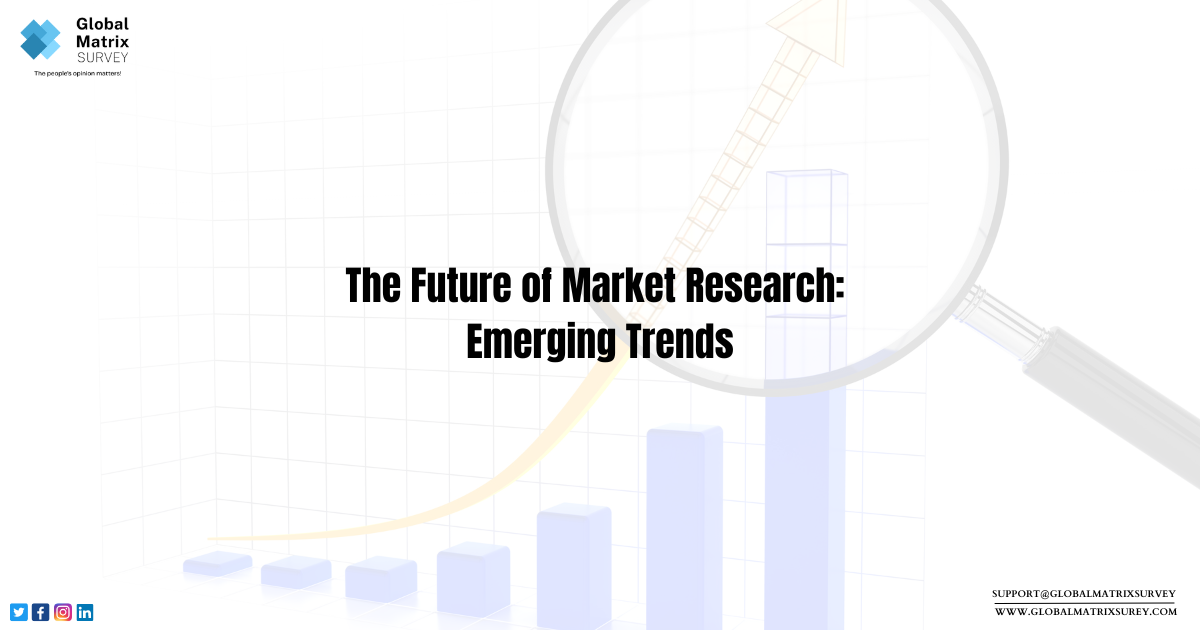Blog | Sat, 25 May 24
The Future of Market Research: Emerging Trends
AI and machine learning are transforming market research by automating processes and providing deeper insights.

The Future of Market Research: Emerging Trends
Introduction
The landscape of market research is evolving rapidly, driven by advancements in technology and changing consumer behaviors. As businesses strive to remain competitive and responsive, understanding and leveraging emerging trends in market research is crucial. This blog explores the future of market research, highlighting key trends that are set to shape the industry.
1. Artificial Intelligence and Machine Learning
AI and machine learning are transforming market research by automating processes and providing deeper insights.
- Predictive Analytics: Machine learning algorithms can analyze historical data to predict future trends, helping businesses make proactive decisions.
- Sentiment Analysis: AI-powered tools can assess consumer sentiment from social media, reviews, and other text data, providing real-time insights into public perception.
- Data Automation: AI streamlines data collection and analysis, reducing the time and cost associated with traditional methods.
2. Real-Time Data and Insights
The demand for real-time data is increasing as businesses need immediate insights to stay agile.
- Social Media Monitoring: Tools that track social media trends in real-time allow companies to respond swiftly to consumer feedback and emerging trends.
- Live Dashboards: Interactive dashboards that update in real-time provide businesses with up-to-date information for quick decision-making.
- Instant Surveys: Mobile and online surveys can gather instant feedback, enabling real-time adjustments to marketing strategies.
3. Big Data Integration
Big data is becoming integral to market research, offering a wealth of information from diverse sources.
- Cross-Platform Data: Integrating data from various platforms (social media, e-commerce, CRM systems) provides a comprehensive view of consumer behavior.
- Advanced Analytics: Big data analytics tools can process vast amounts of information, uncovering patterns and insights that traditional methods might miss.
- Personalization: By leveraging big data, businesses can create highly personalized marketing campaigns tailored to individual consumer preferences.
4. Neuroscience and Biometric Research
Advances in neuroscience and biometric technologies are providing deeper insights into consumer behavior.
- Eye-Tracking: Eye-tracking technology helps understand how consumers interact with products and advertisements, revealing what captures their attention.
- Facial Recognition: Analyzing facial expressions can provide insights into emotional responses to marketing stimuli.
- Neuroimaging: Brain activity monitoring helps researchers understand the subconscious reactions of consumers, leading to more effective marketing strategies.
5. Ethical Considerations and Data Privacy
As data collection methods become more sophisticated, ensuring ethical practices and data privacy is paramount.
- GDPR Compliance: Adhering to regulations like the General Data Protection Regulation (GDPR) is crucial for maintaining consumer trust.
- Transparent Data Usage: Clearly communicating how consumer data is collected and used helps build trust and compliance with ethical standards.
- Data Security: Implementing robust security measures to protect consumer data from breaches and misuse is essential.
6. Voice Technology and Virtual Assistants
Voice technology is becoming a significant tool in market research, changing how consumers interact with brands.
- Voice Surveys: Conducting surveys via virtual assistants like Amazon Alexa or Google Assistant can increase participation rates and gather more natural responses.
- Voice Data Analysis: Analyzing voice interactions can provide insights into consumer preferences and behavior.
- Integration with AI: Combining voice technology with AI can enhance data collection and analysis, offering more detailed insights.
7. Sustainability and Ethical Consumerism
Consumers are increasingly valuing sustainability and ethical practices, influencing market research trends.
- Sustainable Research Methods: Adopting eco-friendly research practices, such as online surveys over paper-based methods, reduces environmental impact.
- Focus on Ethical Brands: Researching consumer attitudes towards sustainability helps businesses align their strategies with consumer values.
- Corporate Social Responsibility (CSR): Understanding the impact of CSR initiatives on consumer behavior can guide businesses in their social and environmental efforts.
8. Augmented Reality (AR) and Virtual Reality (VR)
AR and VR technologies are opening new avenues for immersive market research experiences.
- Virtual Product Testing: Consumers can test products in a virtual environment, providing valuable feedback without the need for physical samples.
- Immersive Focus Groups: AR and VR enable virtual focus groups where participants can interact with products in a controlled, immersive setting.
- Enhanced Consumer Engagement: Using AR and VR in marketing research can increase engagement and provide deeper insights into consumer preferences.
Conclusion
The future of market research is being shaped by technological advancements and changing consumer expectations. By embracing these emerging trends, businesses can gain deeper insights, make more informed decisions, and stay ahead of the competition. As the industry continues to evolve, staying attuned to these trends will be essential for success in the dynamic landscape of market research.
Embracing these innovations not only enhances the efficiency and effectiveness of market research but also ensures that businesses remain responsive to the ever-changing needs and preferences of consumers.

